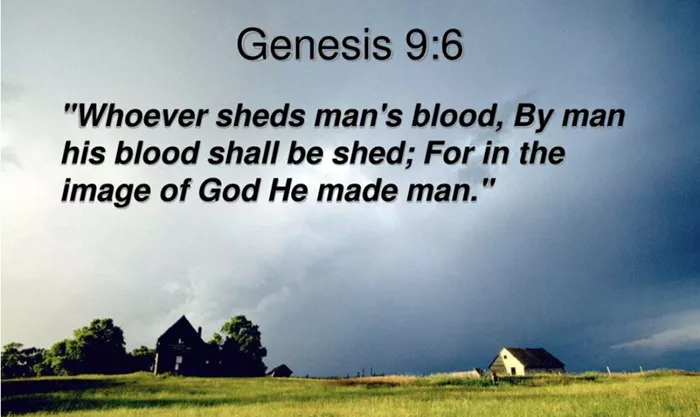Read the Daily Bible Verse Genesis 9:6 To Strengthen Your Spiritual Journey.
“Whoso sheddeth man’s blood, by man shall his blood be shed: for in the image of God made he man.” – Genesis 9:6 (KJV)
Genesis 9:6 KJV Background
Genesis 9:6 emerges within a pivotal moment in biblical history. Following the flood, which had purged the earth of its pervasive wickedness, Noah and his family are instructed by God to repopulate and steward the earth anew. This passage is embedded in a broader context where God outlines the covenant He makes with Noah and his descendants, symbolized by the rainbow. Genesis 9:6 specifically addresses the issue of capital punishment and the sanctity of human life, marking a foundational legal and moral principle in the post-flood world.
Genesis 9:6 Meaning
Genesis 9:6 articulates a profound principle: the sanctity of human life. The verse asserts that murder is a grave sin, directly against God’s will, and thus demands a corresponding retribution. The phrase “by man shall his blood be shed” indicates that the punishment for murder should be executed by human authority. The ultimate reason given is that humans are made in the image of God, which endows human life with intrinsic worth and divine value. This reflects the high regard for human dignity and justice embedded in divine law.
Genesis 9:6 Application in Life
The application of Genesis 9:6 extends into various aspects of life, particularly in the realms of justice and ethics. This scripture underlines the importance of upholding justice and safeguarding the sanctity of human life. For individuals and societies, it calls for a serious view of the moral weight of killing, whether through legal systems or personal conduct. By recognizing the image of God in every person, societies are encouraged to foster respect, protect life, and uphold justice in a manner reflective of divine principles.
See also: What Does Genesis 9:5 Mean?
Comparison with Other Biblical Texts
Genesis 9:6 aligns with several other scriptures that emphasize the sanctity of life and the need for justice. For instance, Exodus 21:12 prescribes the death penalty for murderers, reinforcing the principle found in Genesis. Moreover, in the New Testament, Romans 13:4 discusses the role of governing authorities in administering justice, suggesting a continuity of this principle across both testaments. Additionally, the commandment “Thou shalt not kill” (Exodus 20:13) reinforces the value of life and the moral prohibition against unlawful killing.
Modern Relevance
In contemporary society, Genesis 9:6 remains a critical reference point for discussions on justice, legal systems, and human rights. As societies grapple with issues such as capital punishment, the sanctity of life in medical ethics, and social justice, this verse provides a theological and moral framework for evaluating these complex issues. It prompts reflection on how laws and personal ethics can reflect the divine principle of life’s inherent value and the necessity of fair justice.
Conclusion
Genesis 9:6 offers a profound and enduring insight into the nature of justice and the sanctity of human life. Rooted in the post-flood covenant, this verse underscores the importance of respecting and protecting human life, rooted in the belief that humanity is created in the image of God. Its implications extend through both the Old and New Testaments, influencing Christian ethics and legal systems. In modern times, this verse continues to challenge and inspire us to uphold justice and cherish the divine image within each person, shaping both personal conduct and societal norms.
Genesis 9:6 Commentary
In examining Genesis 9:6, various commentaries provide deeper insights. Traditional interpretations often emphasize the verse as a foundational legal principle establishing the death penalty as a deterrent against murder, reflecting divine justice. Contemporary scholars might explore the implications for modern legal systems and ethical discussions about capital punishment. Overall, the verse is seen as a profound testament to the value of human life and the need for justice, resonating through both ancient and modern contexts.


